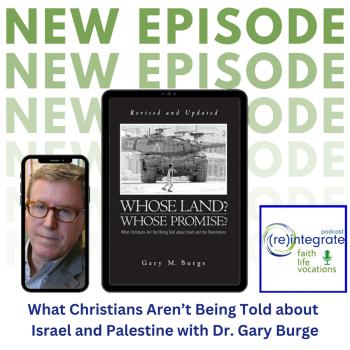 Fifth in a series on the Kingdom of God.
Fifth in a series on the Kingdom of God.
So far, we’ve looked briefly at the views of the kingdom taught by Dispensationalists, Reformed, and Anabaptist traditions.
Dispensationalist: “Kingdom” is God’s reign in the future of the people of Israel in a 1,000-year reign.
Reformed: “Kingdom” is God’s “Already” reign in the hearts of Christians, and the “Not Yet” future reign of God over all the cosmos.
Anabaptist: “Kingdom” is God’s reign over his people (first Israel, now the church – especially manifested in local congregations) as the counterculture showing the world what it looks like to be under the lordship of Christ.
Yet another view is articulated by the Dutch Calvinists, also known as the Neocalvinists.
Neocalvinism and the Kingdom
“The collective work of Geerhardus Vos (a Dutch theologian who taught biblical theology at Princeton) and Herman Ridderbos (a Dutch theologian who taught biblical theology in the Netherlands) stresses redemptive history, all from the center point of Christ’s proclamation of the gospel of the kingdom understood as inaugurated eschatology. Inaugurated eschatology simply means that the kingdom, and eschatological promise, is in the beginning stages of fulfillment already, and will be fully consummated in the future.” (Stephen J. Nichols, “The Kingdoms of God: The Kingdom in Historical and Contemporary Perspectives,” in The Kingdom of God, ed. Christopher W. Morgan and Robert A. Peterson (Wheaton, Ill: Crossway, 2012), p. 43)
However, this version of the “already/not yet” does not make the platonic distinction between the spiritual and the material that George Eldon Ladd’s version does, where the “Already” of the kingdom is a spiritual inner lordship in believers (see “Kingdom of God: Why ‘Already / Not Yet’ is Not Enough”).
It sees “kingdom” as the comprehensive rule of God over everything—not only the rule of God in the lives of individuals (i.e., Reformed theology that follows Ladd) or in the way we live together in the local church as a counterculture (i.e., Anabaptists in the vein of Yoder or more recently McKnight), but in the way we live in every other sphere of society. In this view, God is king of the entire cosmos, not just of the people of God.
Kuyperian Theology on Kingdom
Abraham Kuyper, the influential Dutch Calvinist in the late 19th Century and early 20th Century, famously said in his inaugural convocation at the Free University of Amsterdam,
“There is not a square inch in the whole domain of human existence over which Christ, who is sovereign over all, does not cry: ‘Mine!’”
According to Richard Mouw,
“For Kuyper, every Christian is called to be an agent of the Kingdom of Jesus Christ, wherever they are called by God to serve.” (When the Kings Come Marching In, p. 5)
The reason is that, for Kuyperians like Al Wolters,
“The restoration in Christ of creation and the coming of the kingdom of God are one and the same.” (Albert M. Wolters, Creation Regained: Biblical Basics for a Reformational Worldview, p. 73)
Neocalvinists (those in the Kuyperian tradition) not only believe that “grace restores nature” but they embrace what is called the “creation mandate” or “cultural mandate” found in the opening chapters of Genesis.
Another key of the Kuyperian model is the concept of the spiritual “antithesis:”
“Namely that the human race is divided distinctly between believers who acknowledge the redemption and kingship of Jesus Christ and unbelievers who do not, with the concomitant implications of both life orientations across the whole spectrum of human existence. Thus, a spiritually sensitive and holistic interpretation of Christianity that includes the transformation and development of all aspects of human thought and culture is at the heart of the Kuyperian vision.” (David Naugle, “Introduction To Kuyper’s Thought”)
This means that Christians are to pervade every sphere of society. In what is known as “Sphere Sovereignty,” where
“God’s sovereign rule extends over all of our lives. All of the cultural spheres are in place – to use a Kuyperian phrase – coram deo, before the face of God.” (Richard Mouw, Abraham Kuyper: A Short and Personal Introduction, p. 41)
What this means then, is that the kingdom of God is not limited to the church. Richard Mouw writes,
“Kuyper makes much of the fact that the Kingdom of Christ is much bigger than the institutional church. The Kingdom is that broad range of reality over which Christ rules. Actually, Christ’s Kingdom is the whole cosmos — remember Kuyper’s manifesto about every square inch of the creation belonging to Jesus.” (Mouw, Abraham Kuyper, p. 57)
So this raises even more questions, ones that are the mirror image of yesterday’s questions that came from the Anabaptist position represented by John Howard Yoder and Scot McKnight:
Is the kingdom of God to be understood as distinct from God’s people ruled by God in his church? McKnight insists that “kingdom” in the Bible means a people ruled by a king – If the kingdom of God is “bigger than the institutional church,” then what is the church? What is the church’s relationship with the kingdom? What is “kingdom work?” Is it what Christians do to show the world what it means to be under the Lordship of Christ, or is it bringing about the common good in the world in general?
Next week:
Is the Kingdom Bigger than the Church? Neocalvinist vs. Anabaptist Views
Image by woodleywonderworks. Used with permission. Sourced via Flickr.













